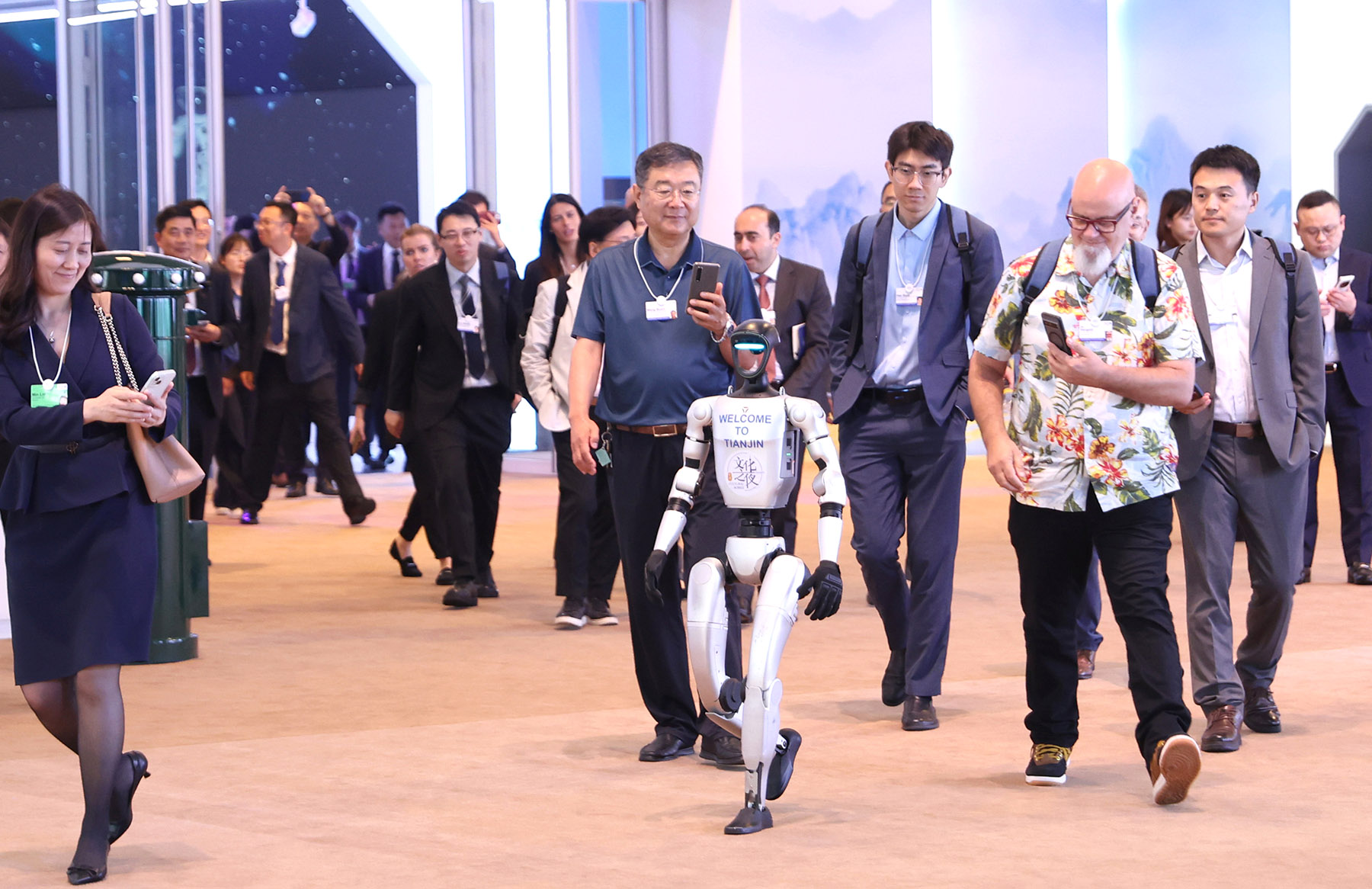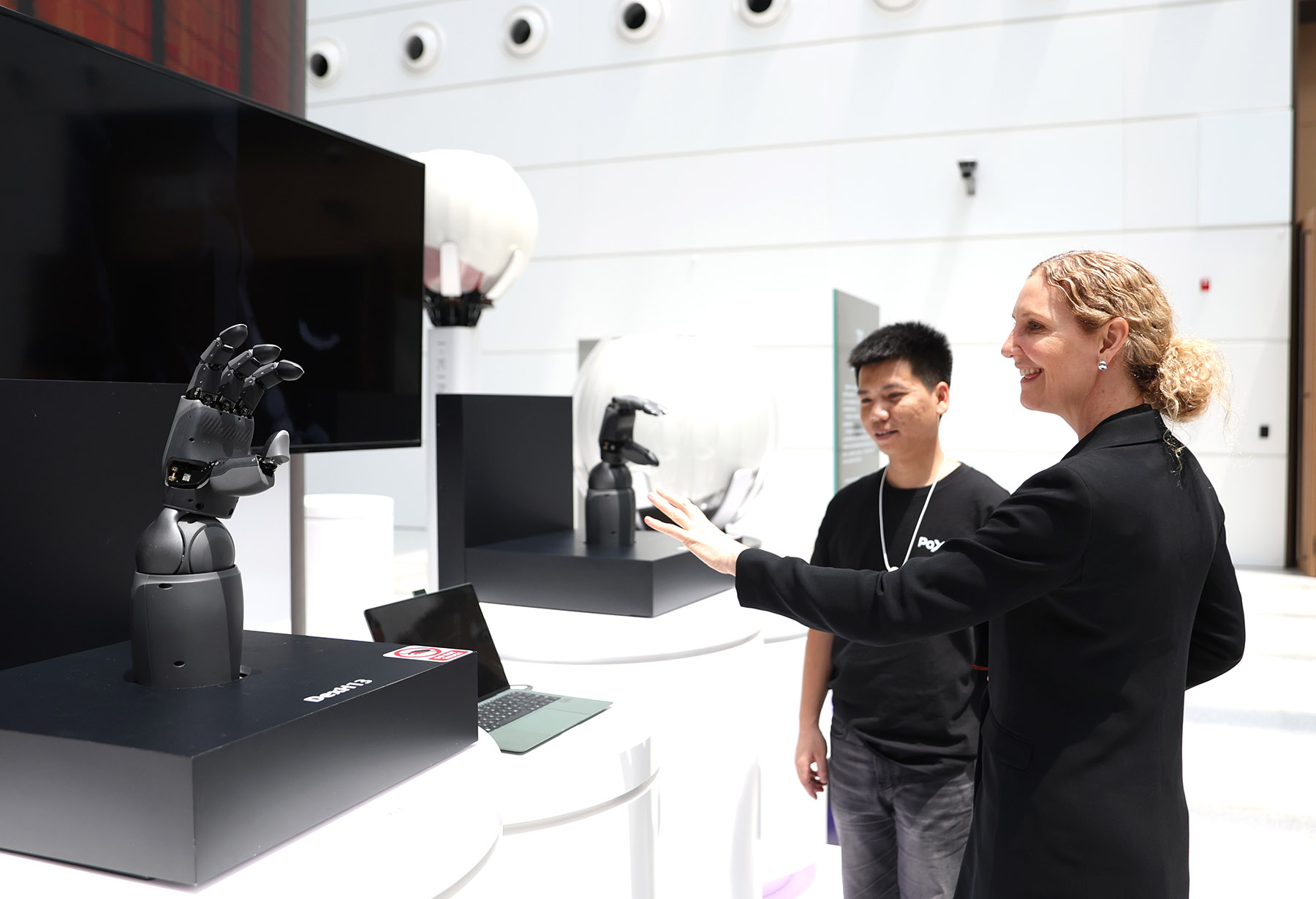Nation at forefront of technology; recognizes nascent sector as essential tool in fostering new quality productive forces, growth

China's accelerated efforts to boost the application of fast-evolving artificial intelligence in a wide range of sectors will help the country gain a competitive edge in tech frontiers and create immense business opportunities for investors amid external uncertainties, said experts and entrepreneurs.
China, they said, is at the global forefront in the development and application of AI technology, which has become a vital force bolstering its economic development and industrial upgrades, as the country recognizes AI as an essential tool in fostering new quality productive forces and building up new growth drivers.
The country's super-large market, robust engineering talent pool and thriving innovation ecosystem will underpin its capacity to drive technologies from research labs into the industrial arena, they added.
READ MORE: AI evolution promoted as key driver of productivity
Zhu Min, former deputy managing director of the International Monetary Fund, said China will make great strides in the use of AI technology in the next 18 months to two years, emphasizing that the country's large-scale manufacturing, vast consumer market of 1.4 billion people and abundant industrial application scenarios present unique advantages for the development of AI.
Zhu made the remarks during the 16th Annual Meeting of the New Champions, also known as the Summer Davos, in Tianjin last month. He said AI Plus will serve as an important driving force for China's economic growth.
China has surpassed the United States in the number of academic papers issued on AI, taking the top spot worldwide, Zhu said, adding that such papers increasingly focus on the specific industrial applications of AI.
Noting that Chinese AI startup DeepSeek had opened a broad space for AI deployment, he said China's services sector, technology and AI have huge growth potential, with future employment to take place in these emerging fields. It is highly significant in strengthening retraining in the job market and letting people know how best to use AI, he added.
Goldman Sachs analysts said breakthroughs in generative AI have the potential to bring about sweeping changes to the global economy. These breakthroughs could drive a 7 percent, or about $7 trillion, increase in global GDP and lift productivity growth by 1.5 percentage points over a 10-year period, they said.
Under the AI Plus initiative, China will work to effectively combine digital technologies with its manufacturing and market strengths, according to this year's Government Work Report.
China will support the extensive application of large-scale AI models, and vigorously develop new-generation intelligent terminals and smart manufacturing equipment, the report said.

Li Haitao, dean of Cheung Kong Graduate School of Business in Beijing, said AI is profoundly reshaping the business landscape and is bound to transform various industries. Currently, China and the US have the greatest potential to lead in the next round of AI revolution, he noted.
According to Li, China boasts a large number of well-educated engineering talent and AI professionals, improved digital infrastructure such as 5G and computing networks, massive amounts of data, and ever-increasing innovation capabilities, which provide a solid foundation for the training and adoption of AI models.
The emergence of Chinese AI companies such as DeepSeek is due to the country's long-term and accumulated achievements in multiple leading fields, such as education, internet, 5G communication, digital payment, technological infrastructure and renewable energy, Li added.
China's AI sector will make big strides in the next 10 to 15 years, with its market size reaching 1.73 trillion yuan ($241 billion) by 2035, accounting for 30.6 percent of the global total, said market research company CCID Consulting.
"The recent wave of AI innovation, led by open-sourced large language models, is so encouraging that companies are quickly mobilizing themselves to harness such technologies," said Samantha Zhu, chairperson of Accenture Greater China.
She underscored that China is emerging as "an innovation-driven economy", with breakthroughs in areas like AI, robotics, renewable energy and electric vehicles, showcasing the country's growing capability in critical technologies that underpin long-term competitiveness.
The consultancy estimates that adopting a holistic approach to productivity, with generative AI acting as a multiplier, could boost productivity growth from 1.9 percent to 15.9 percent. It said China has one of the most vibrant AI ecosystems in the world, driven by a mix of enterprise adoption, tech startups and public-private partnerships.
To fully capitalize on the opportunities, multinational corporations should empower local teams to codevelop AI solutions with local partners, integrate AI into core operations and leverage China as a strategic launchpad for scalable innovation, it added.
Zhu emphasized that with more Chinese companies surveyed expecting their generative AI solutions to be adopted at scale within their organizations this year, there is strong momentum for AI-driven transformation as businesses quickly integrate it into decision-making, operations and customer engagement.
"Looking at the vibrant AI ecosystem, we can say that China is not just an AI market — it's a proving ground for AI adoption by enterprises at scale."

Zhu's views were echoed by Karel Eloot, senior partner of McKinsey &Company.
China, Eloot said, has good technological infrastructure in terms of digitalization and AI, and has developed a world-class business-to-consumer ecosystem, laying a strong foundation for further innovation.
"Chinese companies have been very open to experiment with new things so that they can learn very fast," Eloot said, adding that Chinese firms are at the forefront of digital analytics and technology transformation. He said generative AI is very important for the future development of "lighthouse factories", which represent the highest level of global intelligent manufacturing.
"The application of AI in the high-tech manufacturing sector will bring about greater value than its use in terminal products, as this cutting-edge digital technology will significantly improve the production efficiency and competitiveness of China's manufacturing enterprises," said Li Dongsheng, founder and chairman of Chinese consumer electronics maker TCL Technology Group Corp.
Li said AI technology is increasingly embedded into terminal devices, intelligent production lines and product research and development, and will bolster the development of China's high-tech manufacturing sector.
He emphasized that China's recent breakthroughs in large language models, along with the meteoric rise of domestic AI startup DeepSeek, have enabled it to rapidly catch up with the US in the AI domain, while surpassing most other developed economies in terms of AI application.
Zhou Yunjie, chairman and CEO of Chinese home appliances giant Haier Group, said AI is expected to be the biggest technological revolution in the next 50 years. "At present, the deployment of AI in enterprises mainly concentrates on manufacturing, research and development, sales, procurement and services.
"Every industry will integrate with AI, and any enterprise that does not embrace AI will eventually be weeded out," Zhou said.
Haier has invested heavily in developing LLMs and is promoting the adoption of AI across various fields, such as household appliances and industrial internet, he added.
As AI is transforming the world and data centers are leading the way, US-based smart building solutions provider Johnson Controls is promoting timely, efficient and sustainable data center deployments across countries.
"China's focus on digitalization and decarbonization aligns seamlessly with Johnson Controls' core expertise. We are well positioned to support China's advancement in driving new quality productive forces," said Anu Rathninde, president of Johnson Controls Asia-Pacific.
ALSO READ: China in vanguard of global AI advances
He said China's economy is propelled by new energy, digital transformation and some key industries like smart manufacturing and modern services, which create a large number of opportunities for sustainable innovation. "We look forward to growing our business even further."
Cui Jingyi, vice-president and general manager of industrial software developer Aveva China, said China is becoming the market with the most extensive application of AI technologies globally, bringing new opportunities for many companies including Aveva.
Cui said China demonstrates exceptional vitality in innovation, with rich industrial application scenarios, a complete supply chain ecosystem, and a highly open and supportive technology environment.
"That's why Aveva is continuously increasing our investment in the Chinese market — especially in R&D — as we deepen our roots in this dynamic landscape and cocreate a smarter, more sustainable industrial future together," she said.
Aveva will continue to increase investments in China, leverage local strengths and drive industrial transformation through technological innovation, Cui added.
Contact the writer at fanfeifei@chinadaily.com.cn


